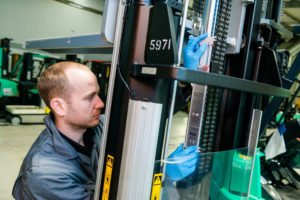Lifting and Handling
Abrasive materials and certain chemicals can ‘shorten the life of important components’
Is your site damaging your equipment? CFTS warns that work equipment used for heavy-duty operations may require more frequent Thorough Examinations than owners think.

 CFTS, the body behind the national standard for lift truck Thorough Examinations, has said that certain industries are at higher risk of fault-related accidents if they do not arrange inspections often enough.
CFTS, the body behind the national standard for lift truck Thorough Examinations, has said that certain industries are at higher risk of fault-related accidents if they do not arrange inspections often enough.
“Operations like construction, metal manufacturing or aggregate processing use abrasive materials, which over time can damage equipment,” said CFTS Chairman, Geoff Martin.
“Similarly, if a truck is used on a site where chemicals are present, corrosion is a serious hazard to look out for.
“For example, chains are vulnerable, even though they have been made and tested for the stresses of day-to-day operations. A CFTS Thorough Examination will identify any signs of corrosive fatigue on your chains or other lift truck components.”
As per LOLER and PUWER regulations, each lift truck must have a Thorough Examination at least once a year, but equipment could require a more frequent inspection schedule depending on the nature of the site, truck and tasks.
According to CFTS, the type of truck and the use of attachments will affect when you book a Thorough Examination. If it has fitted attachments, an inspection must be arranged every 12 months. This changes to 6 months if attachments are not permanently fitted to the truck, or if the truck has an elevated operator position or working platform for lifting personnel.
“The amount the truck is used also plays a significant role in determining how often an inspection is needed,” added Geoff Martin.
“Get it checked every four months if it is used over 80 hours a week, every six months if it used 40 to 80 hours a week, or every 12 months if it is used under 40 hours a week.
“If you are planning on making any changes to your work equipment or how it is used, then your Thorough Examination intervals might be affected. A CFTS-accredited Thorough Examination engineer can help you determine this.”
[vc_row][vc_column width="2/3"][vc_column_text]
Approaches to managing the risks associated Musculoskeletal disorders
In this episode of the Safety & Health Podcast, we hear from Matt Birtles, Principal Ergonomics Consultant at HSE’s Science and Research Centre, about the different approaches to managing the risks associated with Musculoskeletal disorders.Matt, an ergonomics and human factors expert, shares his thoughts on why MSDs are important, the various prevalent rates across the UK, what you can do within your own organisation and the Risk Management process surrounding MSD’s.[/vc_column_text][/vc_column][vc_column width="1/3"][vc_single_image image="82165"][/vc_column][/vc_row][vc_row][vc_column][vc_btn title="Listen now!" color="success" link="url:https%3A%2F%2Fwww.shponline.co.uk%2Fpodcasts%2Fapproaches-to-managing-the-risks-associated-musculoskeletal-disorders%2F|title:Listen%20today!"][/vc_column][/vc_row]
Abrasive materials and certain chemicals can ‘shorten the life of important components’
Is your site damaging your equipment? CFTS warns that work equipment used for heavy-duty operations may require more frequent Thorough Examinations than owners think.
Safety & Health Practitioner
SHP - Health and Safety News, Legislation, PPE, CPD and Resources Related Topics
Company fined as worker has leg amputated
Almost half of UK manufacturing employers have increased spending on workforce health and wellbeing
Metal recycling company fined after employee’s arm severed
